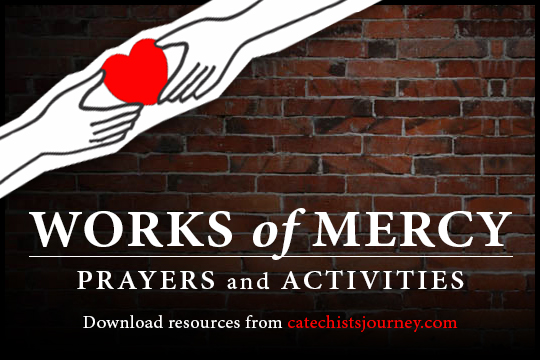For years, State Farm Insurance has promoted itself as being a “good neighbor” with its popular jingle, “like a good neighbor, State Farm is there.”
httpv://www.youtube.com/watch?v=gRS4shfH1Pw
The gospel for this Sunday challenges us to be a good neighbor but adds a definition for what it means to be a good neighbor: it means to be one who shows mercy. Being a good neighbor means more than just maintaining a clean lawn and keeping the noise down. To show mercy is to show compassion and compassion is not something that can be legislated or scheduled in some legalistic manner: it must flow from the heart. At the same time, our hearts need to be predisposed to showing mercy lest they grow hardened. We need to practice being a good neighbor – by showing mercy – to those in need. That all begins by being more aware of the needs of others in the same way that God has responded to our needs with mercy.
On his blog, Living Sacrifice, Rev. Christopher Mahar encourages us to practice Spiritual Works of Mercy as a way of being a good neighbor. He offers the following reflection questions which I find very fitting in terms of raising our awareness of those in need.
1. To counsel the doubtful
Are there any people in our lives who right now doubt their faith in God or their ability and desire to live out that faith in the Church? Are there people in our lives that are no longer convinced that God is close to them and really wants to lead them to joy and peace? We should never underestimate what a word of encouragement or counsel can do for them.
2. To instruct the ignorant
Are there people today who are ignorant of the greatest truths that God has revealed to us through Christ, truths that have been passed down to us through the apostles and have the power to lead us to eternal life? By all means, yes. Is there some small way that God is challenging us to share that faith and those truths with those who do not know them?
3. To admonish sinners
I think most people recoil at this one. We care more about how others perceive us than we do about our neighbor’s spiritual well-being and salvation. To admonish one who is in sin means firstly to pray hard for them, and then with great charity and humility to take a chance and share with them an aspect of their lives that-if unchecked-will not only bring them unhappiness and sorrow but may even cause them great spiritual harm. To admonish is an act of love, not of judgment.
4. To comfort the afflicted
Aren’t there countless people in our lives who are afflicted emotionally? Physically? Psychologically? How are we called, in some small way, to comfort them this week?
5. To forgive offenses
There are often times that we feel offended by the words and actions of others. Doing everything we can to forgive them is a spiritual work of mercy.
6. To bear wrongs patiently
Who among us doesn’t need to be more patient with the faults and weaknesses of those around us? When we are able to bear those everyday slights and quirks of others, and perhaps even some of the more serious grievances of our neighbor with patience, we perform a service that may go unnoticed by many but not by God.
7. To pray for the living and the dead
Finally, when we continue our daily conversation with God, are we attentive to bringing before Him the persons who are a part of our daily lives and intentions? Do we remember always those who have “gone before us marked with the sign of faith,” knowing that our prayers can do so much for the ones we love?



Leave a Reply